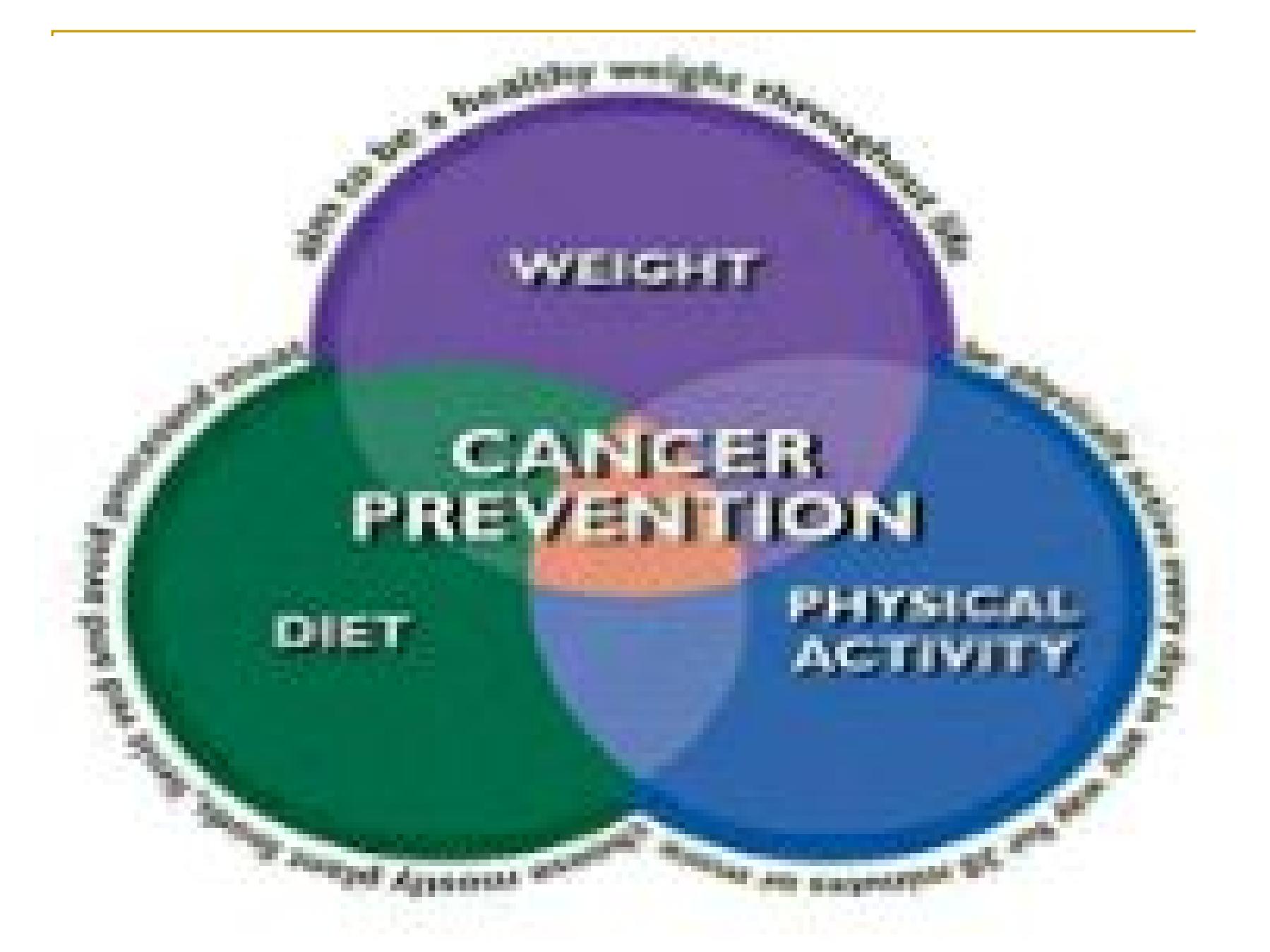
Cance r &Diet
Obje ctive s:
n
Have to know the dietary risk factors on
cancers, dietary &physical activity preventive
role.

Cance r &Die t
Nutrition plays an important role in the initiation,
promotion and progression of cancer.
This is a field of active research, and many
associations between particular foods and nutrients
and specific cancers are controversial.
An estimated 25 %of all cancers in developed
countries can be attributable to diet in adult life.

n
Risk is increased with excessive weight gain
during adult life, BMI >30.
n
Increase calories during childhood &
adolescence.
n
Each alcoholic drink per day probably increases
risk by about 10%(incr. estrogens in the
bloodstream).
Br e a s t C a n c e r Di e t a r y R i s k
F a c t o r s :


Pre ve ntion:
n
Reducing caloric intake and increasing physical
activity in order to prevent or minimize weight gain is
likely to be beneficial.
n
Monounsaturated fats may actually be protective.
n
Higher consumption of vegetables may be associated
with a 20%reduction in breast cancer risk (carrots,
broccoli,& cabbage) at least 5 servings of vegetables
and fruits/d,& try to vary these vegetables and fruits
from day to day.
n
Mushrooms
appears
to
inhibit
aromatase
activity
which
is
an
enzyme
that
helps
the
body
make
estrogen
)
100
gm
/
d
.
)
n
Avoidance of excess alcohol intake.

Colorectal Cancer Dietary Risk Factors:
n
High consumption of red meat increases risk two-folds
(increase turnover of the epithelial cells of the colon), and/or
carcinogens, which may be created during the high temperature
cooking of animal protein.
n
High intakes of saturated fat increase the risk of colon cancer.
n
Low folic acid intake from supplements or green vegetables.
n
Obesity has been shown to be associated with colorectal
cancers.
n
High alcohol consumption is a risk factor.
n
There is a possible inverse association with vegetables, but
greater vegetable and fruit fiber intake has been associated
with colonic ca. (high fiber intake more than recommended).
n
Benefit from higher cereals& grains fiber intake (more than
recommended) is unlikely to be protective.

Prostate Cancer Dietary Risk Factors:
n
Two recent follow-up studies have observed an
increased risk among men with higher meat
consumption( especially red meat).
n
High fat intakes increase risk for prostate cancer.
**Higher intake of the antioxidant lycopene, found in
tomatoes &tomato products, has been associated with
lower risk of prostate cancer in several studies.
Lung Cancer:
n
Green and yellow vegetables are protective among
smokers, but no dietary factor can abolish the effect of
smoking
.

OTHER CANCER SITES:
n
Alcohol, particularly in conjunction with smoking,
increases risk of cancer of the liver, esophagus, oral
cavity cancer while vegetables and fruits appear to be
protective..
n
In Asia, consumption of salted foods may partially
account for higher rates of stomach cancer.
**(High intakes of vegetables and fruits ( 5 servings/d)
decrease the risks of lung, stomach, colon, esophagus
and oral cavity cancers. protective effects for breast
and prostate cancers

Tips for eating a healthy diet:
n
Eat a varied diet.
n
The guidelines suggest that healthy eating plans include:
a variety of foods;
**5 or > servings of fruits and vegetables each
day; most foods from plant sources,
**6 or > servings of bread, pasta, and cereal
grains daily;
**limited high-fat foods, especially from animal
sources
**minimal levels of simple sugars and sodium.
n
Make fruits and vegetables (green veg.) part of every
meal. Eat vegetables& fruits as a snack.

n
Choose chicken, fish, or beans instead of
red meat & avoid processed meat
((The less red meat the better <one-two
servings/ wk)).
n
Do not blacken or char meat, chicken or
fish
n
Choose foods like pasta, brown rice, and
whole wheat bread.

n
Folic acid (found in green vegetables& in many
multivitamin supplements) has been associated with
decreased risk of both colon polyps (the
precancerous lesion) and colon cancer itself, at
least 400µg.
n
Consuming a multivitamin supplement for more
than 15y had less than a half the risk of colorectal
cancer compared to women who did not use
supplements.
n
Reduction of salt intake could reduce stomach
cancer risk.

Obe sity &Cance r:
n
Adult women who are overweight or obese are more
likely than their leaner peers to develop endometrial,
ovarian, colon, and renal cell cancers.
n
In addition, postmenopausal women who are obese
are at increased risk of developing breast cancer.
(premenopausal overweight or obese have higher
levels of estrogens because of peripheral conversion
in adipose tissue, but postmenopausal estrogen is low
&high levels of androgens).
n
Among men, obesity is associated with an increased
risk of developing colon and prostate cancers
( higher levels of free testosterone), two of the most
common cancers in men.

n
Maintain a healthy weight / height& avoid weight gain
during adulthood by balancing the food consumed
( intake of CHO or fats) with the amount of
physical activity.
n
Try to prevent excessive weight gain & obesity in
children and adolescents by encouraging physical
activity.
n
Avoid sugary drinks.
n
Consuming a minimum of five or more servings of
fruits and vegetables/d.( vitamin supplements are
not an adequate substitute for fruits and vegetables).
n
Use vegetable oils instead of animal fats. Olive oil
appears to be a good choice for general use.
Obesity & Cance r Pre ve ntion

Pre ve ntive Role of Phy sical Activity:
n
Physical activity may reduce the risk of certain cancers;
colon cancer( higher levels of physical activity at least
30 minutes of moderate-intensity physical activity,
such as brisk walking, on most days of the week).
Tips for exercise:
n
Get at least 30 minutes of physical activity every day
n
A lot of things count as physical activity, may be even
in job( active at work). Try walking, jogging,--(the more
you do the better).
